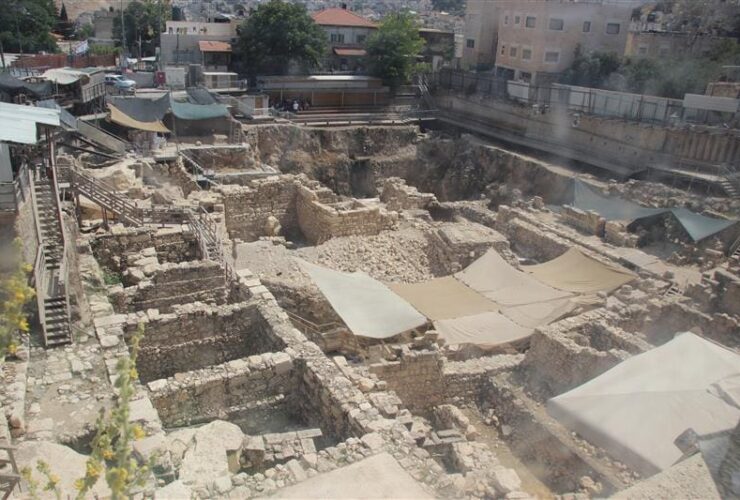While God’s Word has always been mocked and ridiculed, it seems that in these “last days” there has been a renewed effort to discredit the Bible (see 2 Peter 3). Skeptics scoff at the “stories” recorded in the Bible passing them off as myth, legend, and even total fiction. But is their unbelief justified? Or are they willfully denying and suppressing what they know deep in their hearts to be true (Romans 1:18-32)? Whatever the reason, skeptics challenge the Bible at every turn. The Exodus is no exception. Especially criticized is the main event of the Exodus: Israel’s miraculous escape from Egypt by way of the Red Sea. Thus, in what follows I will be dealing with three important questions surrounding this Biblical episode so that we may see if the critic’s unbelief is justified.
1. Could millions of Israelites really have made the Exodus from Egypt to Canaan?
One of the primary issues people have with the Exodus story is the sheer number of people involved. According to Exodus 12:37 there were “about six hundred thousand men on foot, besides children.” But if we include children and women and the infirm then this number would be more like two to three million people. A very large company indeed! While it is true that the Bible makes a point of how fertile the Israelites were in Egypt (Exodus 1:7-9), to have a population explosion from just twelve patriarchs (Exodus 1:1-4) to two to three million in only a few hundred years seems hard to believe. Such a great multitude in the wilderness could also pose certain logistical challenges. For example, would getting millions of people across a narrow channel through the sea even be possible? And what about the food and water requirements? Another issue with such a large population is that the Merneptah Stele dated to the thirteenth-century BC mentions Israel and it seems to suggest that they were small compared to some of the other nations. But if Israel numbered between 2-3 million then they would have been the most populous nation on earth![1]
To overcome these apparent issues some Bible scholars contend that the number 600,000 is actually a mistranslation of the Hebrew text. As one of these scholars explains: “The key Hebrew word here is ‘eleph, which in the standard translations is interpreted as “thousand.” To be exact, there were 600 ‘eleph fighting men.”[2] Okay, so if it doesn’t mean “thousand” here then what does it mean? “One possibility is that ‘eleph should be translated as “family” or “clan.” This is exactly how the same term is used in Judges 6:15, where Gideon says, ‘My clan [‘eleph] is the weakest…’ (see also Joshua 22:14; 1 Samuel 10:19; Isaiah 60:62; Micah 5:2). In this case, Exodus 12:37 actually reports that six hundred families’ worth of fighting men were leaving Egypt. A variation is to suppose that ‘eleph means something like “platoon” or “squadron,” more or less as we have it in Numbers 1:16, “These are the ones selected from the congregation, the leaders of the ancestral tribes, the heads of the squadrons [‘eleph] of Israel.” If each squadron [‘eleph] represented a corresponding clan, and if each squadron was only constituted by ten or so fighting-age men drawn from each clan, then this is quite a game-changer as far as the numbers are concerned.”[3] In fact, this would bring it from 2-3 million down to only about 30,000 at the most.
On the other hand, there are those who believe that reinterpreting Exodus 12:37 in this way is unnecessary and, in the end, creates more problems than it solves. That’s because several Biblical passages seem to confirm this larger population. One of these is Exodus 38:25-26 where God collects half a shekel from every man twenty years old and up. Based on the sum of money collected, there were 603,550 men. Which, again, brings the total population back up to 2-3 million.
But scholars who defend the traditional translation of 600,000 men see no problem with such large numbers. They note that although a population growth from 12 patriarchs to 2-3 million people in only a few hundred years seems impossible, scientific studies in human population growth have demonstrated that it is very possible—especially if the males had more than one wife.[4],[5] They also point out that there are modern examples of massive groups of people fitting into small spaces, so millions of Israelites passing over a dry path through the sea isn’t a problem (especially when God is your rearguard!). Food and water are also not an issue when you consider that God was their sustainer. In fact, He provided them water, quails, and even bread from heaven! Also, based upon the writings of Herodotus, Theocritus, Josephus and others, some have challenged the idea that ancient populations were small and therefore that Israel must also be small.[6]
Unfortunately, there is no consensus among scholars on this issue, and there is a lot more to this discussion,[7] but the good news is that the problem isn’t with the Bible, only our understanding of it. As one author puts it, “the number of elephs recorded in the Bible that departed from Egypt is without error and infallible. The issue is not [with] the Bible…The issue is determining what the original Hebrew text means and translating those figures into English in a way that most accurately reflects the original meaning.”[8]
2. Where did the Israelites cross?
Okay, so numbers aren’t the issue. But many have wondered where it was the Israelites crossed over on dry ground.
The Bible records that this happened at the Red Sea, but this is a massive body of water. So trying to lockdown a specific location is hard. And to make matters even more difficult, some Bible scholars think that the name “Red Sea” is actually a mistranslation of the Hebrew yam suph. They believe that it should be translated “Sea of Reeds” instead. And they offer up three reasons for that. “First, the Hebrew term suph is said to derive from the Egyptian word twf(y), meaning ‘papyrus reeds.’ This is exactly what suph means in Exodus 2:3 and 5, where Moses’ chest is nestled among the ‘reeds’ (see also Isaiah 19:6). Second, the Red Sea is a salt water body, but reeds only grow in fresh water. Therefore, yam suph [they say] cannot refer to the Red Sea. Third, the only reason that suph became associated with ‘red’ is on account of a mistranslation of the Greek Septuagint…”[9] The Septuagint is a pre-Christian Greek translation of the Old Testament. “Apparently not knowing how to translate this term, the…translators wrote ‘Red Sea.’”[10] “This mistranslation was then picked up in Augustine’s Latin Vulgate and has been perpetuated ever since.”[11]
That said, there are still a lot of good Bible scholars who hold to the traditional translation of “Red Sea”, and they also have a good reason. First, they point out that, “even if yam suph technically means Sea of Reeds or Reed Sea, this does not change the fact that the Scriptures…clearly apply the same phrase to the Red Sea, or its extensions, the Gulf of Suez…and the Gulf of Aqabah…That is, in every case the biblical writers intentionally use yam suph to refer to a body of water that they know full well does not have reeds.”[12] Second, it turns out that suph may not always mean “reeds” after all. Suph could also be a variant of soph, which means “end” or “extinction.” If so, then neither “Red Sea” or “Reed Sea” is the correct translation but rather “Sea of the End” or “Sea of Extinction.” This could be taken one of two ways. Taking this translation literally, “Sea of the End” could be referring to the sea at the end of the land of Egypt (which is the Red Sea).[13] But if we take this translation more figuratively then it would be the “Sea of Extinction” meaning that yam suph wouldn’t have anything at all to do with the physical features of the water “but rather with what the water symbolizes: chaos and destruction.”[14] It’s also possible to understand it both literally and figuratively: The sea at the end of Egypt put an end to the Egyptian army.
Of course, at the end of the day nobody really knows exactly where the Israelites crossed. And to be honest, the debate between Red Sea versus Reed Sea (and other nearby bodies of water) becomes almost pointless anyway when we consider how much the geological features of the Earth, including the Egyptian coastline, have changed since the time of Moses. Still, while we don’t know the exact location, of this we can be sure: “it was a significant body of water—large (and deep) enough to drown the Egyptian army…”[15],[16]
3. Could such a split of water really occur?
Out of everything else, this is the number one objection people have with believing that the Exodus was a real event in history. And that’s mainly due to a bias against anything supernatural (more on this later); but what doesn’t help this cause are things like inaccurate Hollywood remakes. One example is the 1956 movie called The Ten Commandments starring Charlton Heston as Moses. And in that film Moses uses his staff to split the waters instantaneously. It’s definitely entertaining to watch but that’s not what really happened. The Bible records that “Moses stretched out his hand over the sea, and the LORD drove the sea back by a strong east wind all night and made the sea dry land, and the waters were divided.” So God used a strong east wind which blew all night which split the waters.
Of course, skeptics still insist that events like this could never happen. But the truth is, similar events have happened. It wasn’t that long ago when Hurricane Irma literally sucked up billions of gallons of ocean water. While there was a lot of coverage on this massive hurricane, Israel365 News (formerly Breaking Israel News) understood its true significance:
“A strange sight straight out of the Bible suddenly appeared when the powerful winds of Hurricane Irma blew away the parts of the Atlantic Ocean, leaving behind swathes of land dry enough for the Children of Israel to tread upon. America witnessed the awe-inspiring might of extremes in God’s mastery over nature when two of the most devastating and powerful hurricanes in history hit the southern Atlantic Coast back-to-back…. Harvey dumped a record 51.8 inches of rain on Texas, …[and] Irma, the most powerful hurricane ever recorded over the Atlantic, displayed an entirely different aspect of God’s might with 190 MPH winds. When Irma finally made landfall in Florida, it had calmed considerably, but the winds were still strong enough to literally blow the ocean away. In the opposite manner of water-laden Hurricane Harvey, Irma made dry pathways through the ocean in precisely the manner described in Exodus when the Children of Israel were in dire straits on the shore of the Red Sea. This amazing and rare phenomenon occurred in both the Bahamas and Florida. Areas normally part of the ocean were suddenly dry, leaving boats and sea mammals stranded. The strange sight was the result of the same forces that flooded Texas, and the same force that divided the Red Sea: powerful winds.”[17]
Upon reviewing video footage of this rare phenomenon atmospheric scientist Angela Fritz, commented: “I knew right away that even though it seemed impossible, it was absolutely legit. As a meteorologist, there are things you learn in textbooks that you may never see in person. You know they happen theoretically, but the chances of seeing the most extraordinary weather phenomena are slim to none.”[18]
While I certainly agree that God used the natural forces of Irma to demonstrate how an event like the Exodus really can happen, we cannot escape the fact that the splitting of the sea in Exodus was a miracle of God. And I’m not just talking about the impeccable timing of it. Notice what Exodus 14:22 says: “And the people of Israel went into the midst of the sea on dry ground, the waters being a wall to them on their right hand and on their left.” While a natural wind could raise the water to a great height on one side and produce “dry land,” natural phenomena like these could not produce a wall of water on both the left and right sides as Exodus records. So it looks as if God used both natural and supernatural means to accomplish this feat. “The natural sign was a strong east wind, signifying that it was done by the power of God, whom the winds and the seas obey.”[19] But the supernatural sign was the walling up of the water on either side of the pathway.
Conclusion (and my own testimony of the supernatural).
As I’ve demonstrated, there’s nothing about this Biblical account that gives us any good reason to doubt it—except, of course, a bias against the supernatural. But is this really a good reason to reject the Exodus or the rest of the Bible for that matter? At one time in my life, I probably would have said yes. Believe it or not, I understand unbelief. Even though I was raised in a Christian home I found myself in a state of non-belief. So, what changed my mind? Simply put, I experienced the supernatural for myself. It was a very real and personal encounter with God that instantly convinced me beyond a shadow of a doubt that He was real and that His word (the Bible) was true. It really was a lifechanging moment. And God encounters like these aren’t unique to me. Countless others around the world have had similar experiences. And what I learned was that just because I had a bias against the supernatural didn’t change the fact that God is real and legitimate miracles, like the Exodus event, do happen. The fact that the Exodus was a miracle doesn’t challenge the reality of that event.

Ryan Hembree is a daily co-host, speaker, and writer of Bible Discovery. He also hosts a YouTube channel that shows the unity of the Bible and how science and Scripture fit together. Ryan also has an honorary Masters of Ministry in Creation Science from Phoenix University of Theology.
[1] Nicholas Perrin, The Exodus Revealed, P.198-199.
[2] Ibid., P.199.
[3] Ibid.
[4] Robert Carter & Chris Hardy, Modelling biblical human population growth
https://creation.com/biblical-human-population-growth-model
[5] Liz Abrams & Troy Lacey, Did 600,000 Men Leave Egypt with Moses?
https://answersingenesis.org/bible-questions/did-600000-men-leave-egypt-moses/
[6] https://www.bible.ca/archeology/bible-archeology-exodus-route-population-of-jews-hebrews.htm
[7] For a more in-depth study check out these articles:
https://biblearchaeology.org/research/chronological-categories/exodus-era/3943-the-number-of-israelites-in-the-exodus
https://answersingenesis.org/bible-questions/did-600000-men-leave-egypt-moses/
https://www.ancient-hebrew.org/studies-interpretation/how-many-came-out-of-the-exodus-of-egypt.htm
https://www.gracecovenantcharlotte.com/blog/how-many-israelites-left-egypt
https://www.bible.ca/archeology/bible-archeology-exodus-route-population-of-jews-hebrews.htm
[8] Bryant G. Wood, The Number of Israelites in the Exodus, Editor’s Note
https://biblearchaeology.org/research/chronological-categories/exodus-era/3943-the-number-of-israelites-in-the-exodus
[9] Nicholas Perrin, The Exodus Revealed, P. 204-205.
[10] Paul R. Williamson, NIV Biblical Theology Study Bible, Note on Exodus 10:19.
[11] Nicholas Perrin, The Exodus Revealed, P. 205.
[12] Ibid.
[13] ESV Global Study Bible: Note on Exodus 13:18.
[14] Nicholas Perrin, The Exodus Revealed, P. 205.
[15] Paul R. Williamson, NIV Biblical Theology Study Bible, Note on Exodus 10:19.
[16] To avoid the miraculous, some people claim that the Israelites crossed in a shallow, marshy pond. But as Bible commentator Chuck Smith quipped, “My, what a marvelous miracle that God could drown a whole Egyptian army in a shallow, marshy pond. One way or another you’ve got to face a miracle in this story. You can’t get away from it. It’s there.” Chuck Smith, Verse by Verse Study on Exodus 13-15.
https://www.blueletterbible.org/Comm/smith_chuck/c2000_Exd/Exd_013.cfm
[17] Adam Eliyahu Berkowitz, Hurricane Irma Recreates Splitting of Red Sea in Florida and Bahamas
https://www.israel365news.com/318528/watch-hurricane-irma-recreates-splitting-red-sea-florida-bahamas/
[18] Robinson Meyer, How Hurricane Irma Is Sucking Florida’s Beaches Dry
https://www.theatlantic.com/science/archive/2017/09/irma-sucks/539325/
[19] Matthew Henry, Commentary on Exodus 14
https://www.blueletterbible.org/Comm/mhc/Exd/Exd_014.cfm






